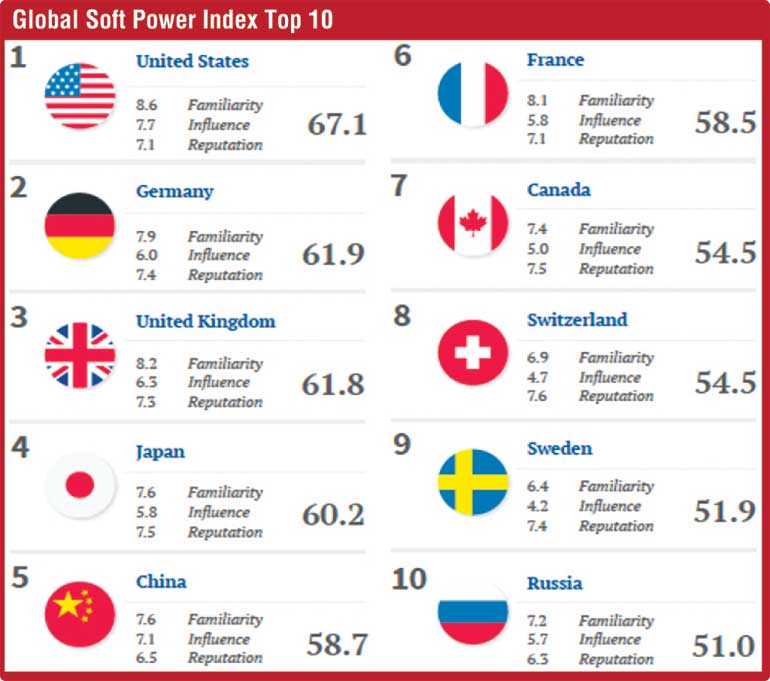Tuesday Feb 24, 2026
Tuesday Feb 24, 2026
Wednesday, 26 February 2020 00:01 - - {{hitsCtrl.values.hits}}
The Global Soft Power Summit, organised by Brand Finance in London yesterday, saw the unveiling of the Global Soft Power Index, the world’s most comprehensive research study on perceptions of soft power, surveying the opinions of more than 55,000 people across more than 100 countries.
Respondents representing both the general public and specialist audiences were interviewed online and by telephone during autumn 2019 about the influence that nations around the world exert upon each other. The top 60 nations were scored across three key metrics - Familiarity, Reputation and Influence - as well as the seven soft power pillars of Business and Trade, Governance, International Relations, Culture and Heritage, Media and Communications, Education and Science, People and Values.
Brand Finance Chairman and CEO David Haigh said: “This study not only allows us to see how the world views the top soft power nations, but it also enables – thanks to the scale of the sample – a more granular snapshot of nation-to-nation attitudes. These findings are vital for governments seeking to better manage their nation brands and improve their soft power influence in specific countries and with specific metrics.”
With the highest Global Soft Power Index score of 67.1 out of 100 and distancing the runner-up by more than five points, the United States is arguably the world’s only soft power superpower, winning on more characteristics than any other country.
“The United States has shown that ultimately, despite the reputational challenges of impeachment and unpredictable foreign policy, its position as the rule-maker in the international system and the world’s only soft power superpower is unrivalled, and it will remain so as long as its economy, media and culture reign supreme,” Haigh stated.
With an overall score of 61.9 and wielding the most soft power in Europe, Germany marginally beats the United Kingdom (61.8) to place second on the index. This is a testament to its deliberate focus on soft rather than hard power. Boosted especially by positive perceptions of its stable economy and governance and despite mixed feelings about Chancellor Merkel’s legacy at home, perceptions of her leadership within the EU and the bold response to the migration crisis have been recognised abroad.
Despite ongoing uncertainty following the Brexit referendum and subsequent withdrawal from the European Union, the United Kingdom ranks third overall, with a Global Soft Power Index score of 61.8 out of 100 proving that the UK has transformed a sense of universal familiarity and favourable reputation into influence on the global stage. Queen Elizabeth II and the Royal Family have been pivotal in maintaining the nation’s relevance as Britain’s economy and hard power are being dwarfed by the rise of the East. The world’s longest reigning monarch the Queen is a powerful symbol of the nation and the Commonwealth.
Perhaps unexpected, nations in the top 10 also include China (58.7) and Russia (51.0), claiming fifth and 10th position in the Global Soft Power Index respectively. Their high rankings have disturbed the Western liberal soft power status quo.
In Asia, the highest-ranking nation is Japan (60.2), claiming fourth spot globally and ranking consistently in the top 10 in all key metrics. Despite an economic slowdown, Japan has reaped the benefits of its strong brands, solid consumer spending and high levels of business investment, ranking first in the Business and Trade pillar. As the third largest global economy, Japan is a forward-thinking and outward-looking nation with the second highest global expenditure on research and development.
Brand Finance Lanka Managing Director Ruchi Gunewardene commented: “Although Sri Lanka is not included in the 2020 analysis, the plan is to extend it to cover all 193 nations in the UN for the next year.”
Just like brands, countries also need to attract a large number of global stakeholders and a tool that countries have today to improve their preference and attractiveness is their soft power. Brand Finance has defined soft power as “a country’s ability to influence the preferences and behaviours of various actors in the international arena (states, corporations, communities, populations, etc.) through attraction or persuasion rather than coercion.”
It is the brand equity equivalent for countries. Soft power has to be built over time, which could take decades but it can be quickly lost due to a crisis and a loss of confidence. If managed well, and with time and effort, the nation can leverage its soft power. The challenge is to identify what should be leveraged for the greater benefit of the nation in the global arena.
The full report and methodology are available at https://brandirectory.com/globalsoftpower/download/
